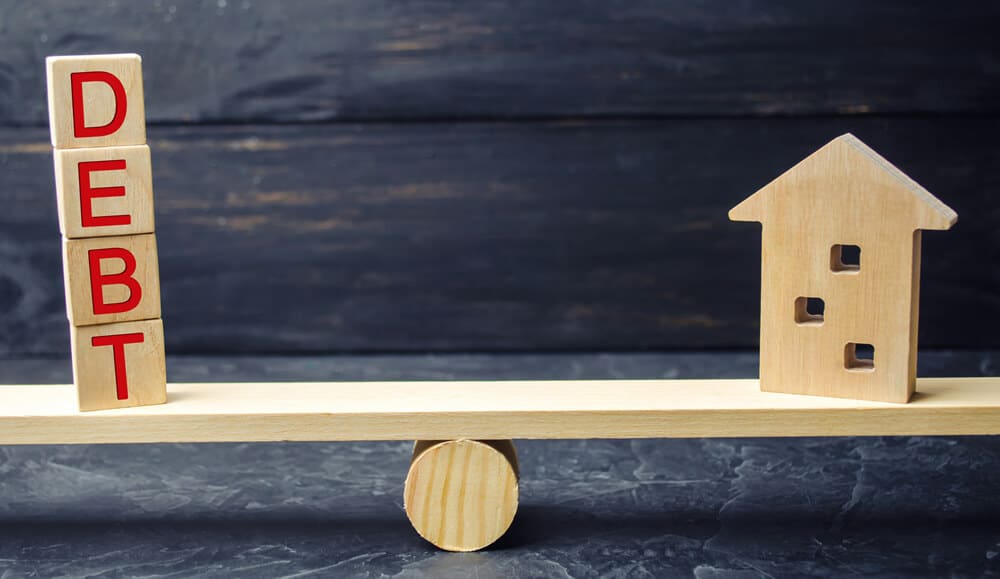When you purchased your new home, you probably never dreamed of it becoming a heavy financial burden. A burden that weighs upon you each month as you struggle to make the mortgage payments that will keep you in your home. To add to that stressor, you know your mortgage is “underwater”.Now, this struggle is straining not only your bank account every monthbut also robbing you of peace about your financial security,and you don’t know what to do.
Does this describe your financial situation with your home mortgage? If so, Chapter 13 bankruptcy could offer a solution to your problem.
What Is an Underwater Mortgage?
When you take out a mortgage on your home, you are borrowing money from the lender to purchase your home. The lender will then hold a lien on your property until you pay it off. A lien is a legal claim that gives the lender the right to take possession of your property if you fail to pay off the debt.
In most cases, when you purchase a home with a mortgage, it is an “above water” mortgage. This means that when you sell your home, there will be enough equity in it to cover all the costs of selling and paying off the loan.
If, however, there is not enough equity in your home to cover these costs, it is considered an “underwater” mortgage. In this situation, there would not be enough money left over after selling the house to pay off all the debts associated with it.
This can happen for several reasons:
- You purchased your home at too high of a price and now owe more than it is worth;
- You took out additional loans against your property; or
- You have experienced some other financial hardship that has caused you to fall behind on payments and lose equity in your property.
The good news for homeowners who find themselves in this situation is that Chapter 13 bankruptcy could help them get out from under their underwater mortgage and avoid foreclosure.
How Chapter 13 Bankruptcy Could Help with an Underwater Mortgage
Chapter 13 bankruptcy restructures debt and repays it through a court-approved plan that usually takes three to five years. Repayment plans may include your mortgage payment and any other debts, such as car payments, medical bills, credit card bills, or other obligations.
Your repayment plan will be based on your income and agreement with the Bankruptcy Trustee. You’ll make regular monthly payments towards your mortgage and other secured debt while making a separate monthly payment to the bankruptcy trustee who will distribute it amongst your other creditors. The latter payment is often much less than you were paying those creditors before filing bankruptcy. Also, the court could order the balance of your missed mortgage payments to be added to that section of the repayment plan. So, by following this court-approved repayment plan, you could catch up on missed payments and pay off your mortgage easier over time, therefore, regaining the equity in your home.
Chapter 13 bankruptcy could also help you with an underwater mortgage if you have a second loan on the property.
Chapter 13 bankruptcy handles secured debt differently than unsecured debt. Secured debt refers to debt with collateral backing it that a lender can repossess if the borrower stops paying their loan. This could include a car loan or a home mortgage. Unsecured debt such as credit card debt or medical bills lacks such collateral.
Many people owe more on their first mortgage alone than their entire house is worth, making their second mortgage, equity line, or other subordinate liens 100% “underwater.” In Chapter 13 bankruptcy, that underwater lien is treated as unsecured debt–no different from a credit card bill–through a process often referred to as “lien stripping.”
“Stripping” second liens (mortgages) through Chapter 13 could provide two benefits.First, you would no longer have to pay the second mortgage each month, freeing up money to pay for living essentials. Second, stripping that second mortgage could help bring your home back to “sea level.” When you pay your first mortgage each month, you would actually be building equity again.
Getting Help Filing Chapter 13 Bankruptcy
Knowing if filing Chapter 13 bankruptcy will be the way to help you with your underwater mortgage can be complex. It depends on your specific financial situation and how that situation aligns with the bankruptcy rules. So, you may want to reach out to an experienced bankruptcy attorney for help to know what action will work best for you.
Brock and Stout’s bankruptcy attorneys have over 25 years of experience helping clients make the decisions that put them on the best path to financial restoration. If you need such help, contact us today for a free evaluation. Let our family help your family.

